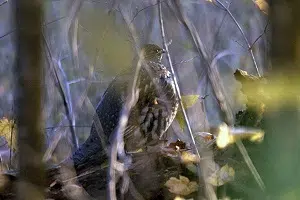The study of West Nile virus in ruffed grouse will resume this fall in Michigan, after a one-year pause due to the COVID-19 pandemic. In partnership with Minnesota and Wisconsin natural resources departments, the Michigan Department of Natural Resources began this multiyear study in 2018 to better understand the prevalence and distribution of the virus in ruffed grouse in the Upper Great Lakes region.
Results from previous study years suggest that while the virus is present in the Great Lakes region, grouse exposed to the virus can survive and develop antibodies as an immune response. In 2019, 20 of the 281 samples collected tested positive for exposure to the virus. Viral antibodies were confirmed in seven birds and likely in 13 additional birds. Only one juvenile male tested positive for the virus. In 2018, 28 of 213 samples were positive for exposure to the virus, with viral antibodies confirmed in nine birds and likely in 19. Four samples were positive for the virus.
“Though the virus can impact the ruffed grouse population, the impact appears to be minimal in Michigan,” said Julie Melotti, a laboratory technician at the DNR Wildlife Disease Laboratory. “In the Upper Peninsula, the overall health of the grouse population is more dependent on high-quality habitat, such as areas of regenerating aspen stands near stands of mature timber. In these areas, grouse are more likely to be healthier and have stronger immune responses to disease, inclement weather and other limiting factors.”
Sample kits have been distributed to grouse hunters in key West Nile virus surveillance areas to collect samples for viral analysis. The samples will be analyzed for antibodies, which indicate exposure to the virus, and heart tissue will be examined to screen for current presence of it. Sample kits were not distributed in 2020 due to the ongoing COVID-19 pandemic, but recently have been distributed to Michigan hunters for data collection during the 2021 season. Hunters who have kits remaining from past seasons are welcome to use them and submit additional samples. Hunters who provide email contact information with their samples will be notified of their results next fall.
West Nile virus was first detected in ruffed grouse in Michigan in 2002. Transmitted by mosquitoes, the virus can cause inflammation of the brain, brain lining, and spinal cord and heart lesions in infected birds. Grouse that have contracted the virus may fly erratically, act abnormally, or appear sick, thin and in poor condition. However, these symptoms are not always present in infected grouse. If you find a bird that appears thin or sick, please report your observations to the Wildlife Disease Lab at 517-336-5030 or through the online reporting system Eyes in the Field.
While most humans that contract West Nile virus are generally symptom-free, about one in five will develop a fever with other flu-like symptoms. While spending time outdoors during periods when mosquitoes are active, the DNR recommends using an insect repellent or keeping exposed skin covered. To learn more about the West Nile virus study in ruffed grouse or about the virus in Michigan, see the West Nile Virus and Ruffed Grouse FAQ.























Comments